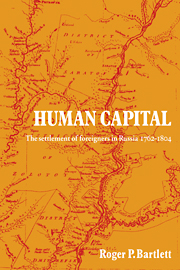Book contents
- Frontmatter
- Contents
- Weights and measures
- Abbreviations
- Preface
- Introduction
- I Antecedents
- 2 Catherine II and the Manifestos of 1762 and 1763
- 3 The response: settlement 1763–1775
- 4 Southern Russia 1764—1796
- 5 Urban and entrepreneurial settlement under the 1763 Manifesto
- 6 Immigration and colonies 1797–1804
- Conclusion
- Appendices
- I The official English-language version of the Manifesto of 1763
- II An Announcement Concerning the Benefits and Advantages of the Colony Katharinenlehn, which is being established on the patterns of the Swiss cantons
- III A contemporary British comment on the emigration to Russia
- IV Observations Sur La Levée des Colonies Russes & L'Emigration des Families Françoises
- V Der zu Strelina mit denen Collonisten, so nach der Ukraine sich zu Etabeliren willig gemacht geschlossener Contract
- VI Rules concerning the reception in future of colonists
- Notes
- Bibliography
- Index
VI - Rules concerning the reception in future of colonists
Published online by Cambridge University Press: 05 May 2010
- Frontmatter
- Contents
- Weights and measures
- Abbreviations
- Preface
- Introduction
- I Antecedents
- 2 Catherine II and the Manifestos of 1762 and 1763
- 3 The response: settlement 1763–1775
- 4 Southern Russia 1764—1796
- 5 Urban and entrepreneurial settlement under the 1763 Manifesto
- 6 Immigration and colonies 1797–1804
- Conclusion
- Appendices
- I The official English-language version of the Manifesto of 1763
- II An Announcement Concerning the Benefits and Advantages of the Colony Katharinenlehn, which is being established on the patterns of the Swiss cantons
- III A contemporary British comment on the emigration to Russia
- IV Observations Sur La Levée des Colonies Russes & L'Emigration des Families Françoises
- V Der zu Strelina mit denen Collonisten, so nach der Ukraine sich zu Etabeliren willig gemacht geschlossener Contract
- VI Rules concerning the reception in future of colonists
- Notes
- Bibliography
- Index
Summary
The official printed Rules based upon the Imperial decree of 20 February 1804. (Author's translation from Russian.) TsGIAL f. 383, op. 29, d. 220, II. 66–90b.
Rules selected from the Statute, confirmed by His Imperial Highness, concerning the reception in future of Colonists wishing to emigrate to Russia for settlement
Foreign Colonists are to settle in the New Russian region.*
This settlement is to be composed only of such people as may be most useful for that region, for example: good farmers, people accustomed to viticulture, the growing of mulberries and other useful plants, also such as are skilful in stock–breeding, and especially in the maintenance and increase of the best breeds of sheep, and such as have in general all necessary knowledge of the best agriculture. Rural artisans, for example: carpenters, blacksmiths, potters, millers, weavers, stone–masons and other craftsmen necessary in the rural way of life, may be accepted; but all other handicraftsmen and artisans who cannot find a living in the villages may not be numbered among the Colonists; for although there is need of urban artisans in the southern region, since it is not possible to limit the number of such immigrants, and the present small population of the region's towns does not yet allow of large numbers of such artisans, especially of one and the same trade, therefore they cannot find good advantage for themselves there.
- Type
- Chapter
- Information
- Human CapitalThe Settlement of Foreigners in Russia 1762–1804, pp. 264 - 267Publisher: Cambridge University PressPrint publication year: 1979



